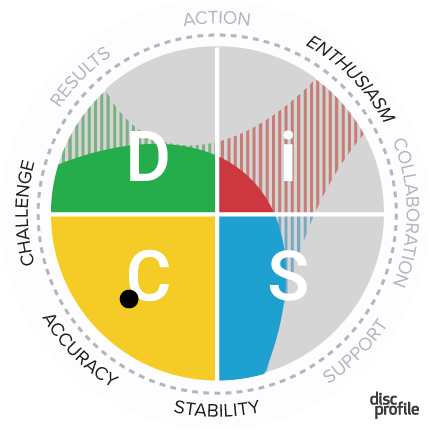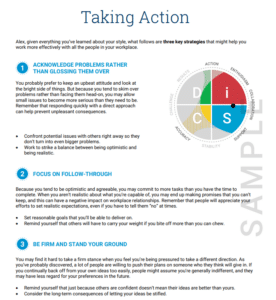Some amount of self-awareness—of how we evaluate ourselves in relation to others—is expected of everyone, and it’s necessary in order to complete any self-reported personality assessment like Everything DiSC®. Sometimes the issue of how self-aware we truly are has been used to criticize assessments. A good example of this is Harvard Business Review’s article “Research: We’re Not Very Self-Aware, Especially at Work.”
“It’s no secret that many of the most popular developmental assessments used for gaining self-knowledge, such as the MBTI, DiSC, The Birkman Method, and The Core Values Index, woefully lack evidence linking their results to actual learning or job performance.”
I found what I think are several misunderstandings of DiSC® in this article.
DiSC® doesn’t measure job suitability or performance
It reminded me of my Everything DiSC certification training where we talked about the misuses of DiSC. At the top of the list was using DiSC for hiring decisions. DiSC isn’t designed to judge your suitability for a particular job or measure your abilities. Personality assessments will not make you a better user of Excel, nor will they decrease your likelihood to embezzle funds. It’s not even designed to make you a better marketer, but I know marketers and salespeople who use their knowledge of DiSC to better communicate with their audience or customer.
A quick or superficial reading of the Harvard Business Review article might make the reader assume that a tool like DiSC isn’t useful because it asks people to answer questions about themselves and many aren’t self-aware enough to do so. It seems to suggest that knowing your profile is not enough.
I agree. And I think most consultants who use DiSC would agree. You can’t stop with knowing you’re an S, for example. This knowledge is only valuable in context. It’s fun to learn your DiSC style and read about how you tend to behave. But it’s not useful unless you use that information to inform your choices, make changes, become a better communicator, or be more patient with the priorities of others.

DiSC priorities
I love that Everything DiSC talks about priorities in addition to types or styles. If you want to motivate me, you need to know my priorities. If you know I’m a C, you can assume that giving me a public award won’t do it. If I know you’re a D, I know that I need to quickly get to my point when asking you for something. Knowledge of the DiSC priorities helps me make more informed decisions when working with others.
I think everyone has enough self-awareness to be able to give an accurate portrayal of their priorities. One reason Everything DiSC stands above other assessments based on the general DISC model is that the publisher has made every effort to reduce issues of social desirability around each style. They ask respondents to answer a questionnaire that has been tested to be sure that one style doesn’t sound more positive than another.
I certainly agree with the article’s authors that we have blind spots. A good coach, HR professional, or consultant will use DiSC as the starting point for conversations about how people differ and how to read, value, and work with those differences. A DiSC profile is a nonthreatening place to begin difficult discussions. In particular, the Everything DiSC Productive Conflict and Agile EQ profiles can challenge one’s thinking about conflict or about one’s default mindset.
The authors of this article state: “So my self-reported profile may suggest that I see myself as a persuasive speaker—but tell that to the audience who just fell asleep.” DiSC doesn’t claim to give an accurate reporting on skills. A consultant could use the knowledge of someone’s DiSC style to motivate them to improve their public speaking skills. They might say something like: “You’re a C style and public speaking might be hard for you or you might prefer to communicate in writing. Let’s look at public speaking as a challenge. Let’s look at how the i-style person in your audience will need more than a great chart to feel engaged. Let’s look at your talk and see how it meets the priorities of each DiSC style.”
From self-awareness to self-development
In the article, Erich C. Dierdorff and Robert S. Rubin also state, “In fact, teams with less self-aware individuals made worse decisions, engaged in less coordination, and showed less conflict management.” Again, I agree. That’s why using tools like DiSC that engage a person in looking at their behaviors and priorities can help. They teach self-awareness. They give team members a way of talking about their perceptions and perspectives. They are a starting point and a shared way of giving and receiving feedback when shared and compared with other team members.

The authors go on to say, “Teach self-development skills in addition to self-awareness.” Absolutely. Take a look at Everything DiSC Work of Leaders, Everything DiSC Agile EQ, or The Five Behaviors® Personal Development. That’s what those products and good consultants do—they move beyond labels and get into the meat of building skills and suggesting a choice of behaviors. That’s why Everything DiSC profiles end with action items or strategies to increase your effectiveness.
In another Harvard Business Review article, 5 Ways to Become More Self-Aware, Anthony Tjan writes
“In the end, we all want self-awareness. Without it, one can never fully lead effectively. It’s only with self-awareness that one can journey closer to a state of ‘self-congruence’—in which what we say, think, and feel are consistent. Building self-awareness is a life-long effort. You’re never ‘done.’”

